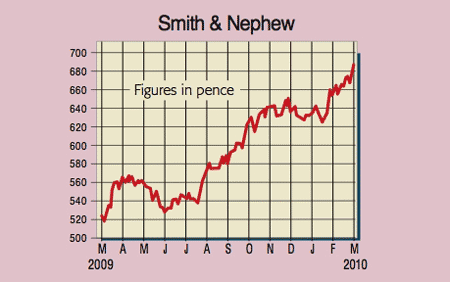
Looking at Smith & Nephew’s stock chart, you might think the business is firing on all cylinders. It isn’t.
On 11 February, S&N released its 2009 results. Although its advanced wound division (23% of sales) showed 6% organic growth, its other two units – orthopaedics (55% of revenue from artificial knee/hip joints and resurfacing products) and endoscopy (keyhole surgery, another 22% of sales) – only mustered 1% like-for-like improvements. So why are the shares trading at near all-time highs?
In short, it’s all down to takeover fever driven by its trophy asset status, the dollar’s strength and a stronger mergers and acquisitions market. At £6bn, some say S&N could attract the likes of J&J, Stryker or Medtronic of the US. This might happen, but any serious offer would need to be pitched north of 850p. And that seems unlikely.
Meanwhile, price pressures are set to rise, which could undermine S&N’s juicy 23.8% Ebita margins. Indeed, a major challenge looms later this year as hospitals come under greater budgetary constraints, defer non-critical operations and demand bigger discounts. For example, a hip replacement in Germany costs about €1,500 (£1,350), whereas in the US it would cost $4,500 (£2,900). So a better-managed US healthcare system – the sector chips in 44% of the firm’s turnover – could exert more power over suppliers and push down prices.
Smith & Nephew (LSE: SN), tipped as a BUY by Investec
And should some version of Obama’s healthcare reforms get approved, the sector is likely to be whacked by extra fees and/or taxes that could knock about 10% off S&N’s earnings. Demand for reconstructive surgery in Europe remains weak. Given the state-funded nature of the continent’s healthcare system, that implies governments are letting waiting lists lengthen. The endoscopy division is also finding life hard, with hospitals delaying the capital-equipment purchases crucial to S&N’s non-invasive instruments business. Lastly, bulls seem to believe that the hip-and-knee market should soon pick up as people who have put off operations get their chequebooks out. But if there is a double-dip recession, how are patients going to find the money?
The City is predicting 2010 turnover and earnings per share of £2.5bn and 44.9p. That puts the shares on a p/e of 15.4 and a yield of just 1.3%. I value the stock on a ten-times Ebita multiple, assuming sustainable margins of 22%. After adjusting for the $943m of net debt, I get a price of 550p. All in all, I think the risks weigh on the downside and investors should sell.
Recommendation: SELL at 693p